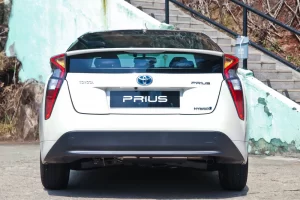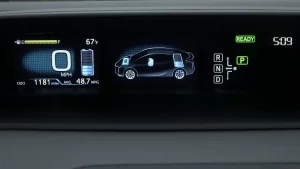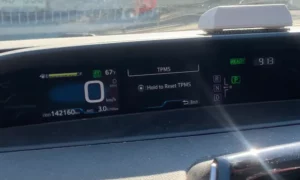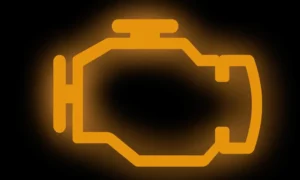If your Prius experiences an issue like low oil pressure, the oil cannot reach the components to lubricate them and make them easier to move. Persistent low oil pressure can cause damage all over the vehicle if it is not remedied quickly. You may notice a burning oil smell or find that your engine overheats often.
The signs of low engine oil pressure
Low oil pressure in a Prius is not always obvious at first. The oil pressure needs to drop to a certain point before symptoms like an overheating engine, burning smells, and grinding noises become noticeable.
Below is a list of signs to look for if you suspect there is something wrong with the oil pressure. It will not always be low oil pressure that causes these symptoms, but it will have something to do with the oil pressure.
Your engine overheats in conditions that are fairly normal
When a Prius’ engine overheats, it’s because there’s not enough coolant in the system, the weather is far too hot for the engine to handle, or there’s an issue with the radiator.
However, these are all individual issues that can be fixed with the help of a mechanic.
But if you took your Prius to get serviced recently and none of these issues came up, then your vehicle should be fine. Unfortunately, your engine is now overheating, which means there is something wrong.
The issue could be low oil pressure. Low oil pressure is harder to detect than a broken radiator or low coolant.
Here are a few other issues that could have to see if there’s anything to overheat: the thermostat does not alert the Prius’ computer to dangerous temperatures, the radiator fan is not working, or there is not enough coolant in the cooling system.
A burning smell will appear from the engine during acceleration
The purpose of motor oil in an engine is to lubricate the moving parts and components so that they can work together without scraping, scratching, or grinding on one another. Without motor oil, the moving parts will scrape against each other.
Unprotected scraping, if not checked, will lead to severe damage later in the future. The components moving and twirling and pumping inside of the Prius will burn as they grind together. This generates the burning smell.
Your Prius stalls or it cannot speed up as fast as it once did
When a vehicle stalls, that means its engine is suffering or failing because the components that power the vehicle are not working.
Also, if the vehicle cannot speed up to a certain speed as fast as it once did, there is something preventing it from accelerating quickly. Acceleration is caused by the fuel, water, and combustion process inside the engine.
How to fix low oil pressure in a Prius
First, low oil pressure in a Prius means that there is not enough oil to lubricate all the components. It might mean that there is not enough pressure in the system to push the oil around the engine. First, add more motor oil to your Prius.
Then, we must find the reason there wasn’t enough oil in the system.
There could be an opening or several cracks, allowing motor oil to leak out. Also, there might be enough oil, but it is old and dirty and no longer flows around the engine. Dirty oil must be completely washed out and replaced with fresh oil.
When was the last time you took your Prius to get its oil changed?
Every vehicle on the road needs to have its oil changed. The old rule stated that motor oil must be changed every 3,000 miles. This rule is outdated. Each vehicle now has its own time and metrics for when to change the motor oil.
For a Prius, the oil must be changed every 10,000 miles or every 6 months.
If you are passed the 6 months or 10,000-mile mark, it is time to take it in.
Issues with the oil pressure sensor
If the Prius mechanic says there is no problem with the oil pressure, then something is wrong somewhere else. The mechanic’s diagnostic tools should communicate with the Prius’ onboard computer to find the issue.
Since the oil pressure is fine, we must now investigate the oil pressure sensor.
When there’s an issue with the oil pressure, the LOW OIL warning light will appear on the dashboard or on the computer screen of your Prius. This light will also appear when there is an issue with the sensor.
When the sensor is old, damaged, or needs to be replaced, The LOW OIL light will flash on and off. Show the mechanic that the low oil light is still on the dashboard. They will know something is wrong with the sensor and not the actual oil pressure.
The oil pressure sensor can break in several ways. The oil sensors could have been damaged in an accident. It could have become loose and then wedged itself between moving parts. The area around the oil sensor may have overheated and damaged it.
It is better to replace the damaged oil pressure sensor than to repair it, as repairing it and replacing it will cost the same.
A new oil pressure sensor will not cost more than $75. However, the actual cost is the cost of labor. It will cost $150 for a mechanic to replace the oil pressure sensor.
It is possible to swap out the old oil pressure sensor with a new one yourself, but you have to know your way around vehicles. If you don’t, it’s better to just fork over the money and have the mechanic replace it.
Conclusion
A new oil pressure sensor won’t cost more than $75. The cost of labor can easily bring the total price of replacing the oil pressure sensor to over $200. A typical Prius needs to have its oil changed every 10,000 miles or after 6 months of driving. When there is an issue with the oil pressure, the warning sign LOW OIL will flash on the dashboard or computer screen. A hole or crack could cause motor oil to leak out of the Prius. The oil could also be dirty.











